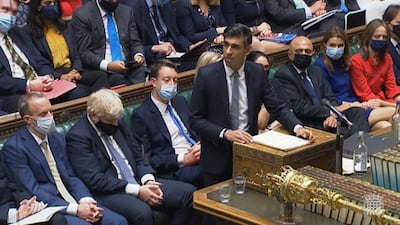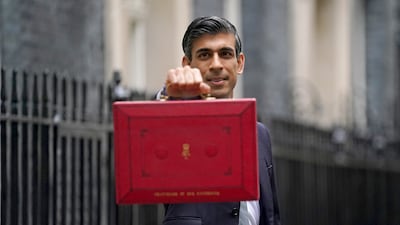Britain’s Chancellor of the Exchequer Rishi Sunak set out a vision of Britain's future as a global science and tech superpower in his Autumn budget on Wednesday, as he pledged to boost research and development, incentivise green investments and attract overseas talent.
The UK economy is set to grow 6.5 per cent this year, Mr Sunak told the House of Commons, more quickly than expected, but he gave a warning that inflation will hit an average of 4 per cent next year as the reopening of economies across the globe strains supply chains.

The economic rebound, faster than the Office for Budget Responsibility's initial forecast of 4 per cent, is in line with Mr Sunak’s promise of a “stronger economy of the future”, after the country was hammered by the Covid-19 crisis.
Mr Sunak’s buoyant mood saw him unleash a wave of spending including sizeable investments in the transport and health sectors, as well as an increase in the minimum wage and the removal of a pay freeze on public sector pay. He also set an overall goal to cut taxes by 2024/25.
In total, Mr Sunak unleashed an uplift to departmental spending of £150 billion ($206bn) as he committed to building stronger public services, “levelling up” the economy, driving business growth and help working families with the cost of living.
Meanwhile, a total of £30bn has been committed to a green industrial revolution in the UK ahead of the Cop26 environmental summit next week, after £26bn of capital investment was unveiled for the country's Net Zero Strategy last week.
The rosy outlook also means Britain's spending on foreign aid will return to 0.7 per cent of economic output by 2024/25. The target was temporarily ditched because of pressure on the public finances during the pandemic.
“Employment is up. Investment is growing. Public services are improving. The public finances are stabilising. And wages are rising,” Mr Sunak said in his speech to the House of Commons.
“Today's budget delivers a stronger economy for the British people: stronger growth, with the UK recovering faster than our major competitors.
“Stronger public finances, with our debt under control. Stronger employment, with fewer people out of work and more people in work. Growth up, jobs up, and debt down: Let there be no doubt — our plan is working.”
To boost the recovery further, Mr Sunak has promised £20bn for research and development in addition to tax reliefs. Put together, this means total public investment in R&D has increased from 0.7 per cent of gross domestic product in 2018, rising to 1.1 per cent of GDP by 2024/25 — well above the 2018 OECD average of 0.7 per cent and ahead of Germany, France and the US, he said.
Of the £30bn committed to Britain's green industrial revolution, £380 million will go towards the UK's offshore wind sector while £6.1bn will help to deliver the Transport Decarbonisation Plan, by boosting the number of zero-emission vehicles on the roads, helping to develop greener planes and ships, and encouraging more trips by bus, bicycle and on foot.
A planned rise in fuel duty will be cancelled because of pump prices being at their highest level in eight years.
Meanwhile, domestic flights between airports in England, Scotland, Wales and Northern Ireland will be subject to a new lower rate of air passenger duty from April 2023. However, there will be an increase in duty on long-haul flights of more than 5,500 miles.
Mr Sunak said: “We’re also making changes to reduce carbon emissions from aviation. Most emissions come from international rather than domestic aviation.
“So I’m introducing, from April 2023, a new ultra-long-haul band in air passenger duty — covering flights of over 5,500 miles, with an economy rate of £91.
“Less than 5 per cent of passengers will pay more but those who fly furthest will pay the most.”
Separately, £3.9bn will go towards decarbonising buildings, including £1.8bn to support tens of thousands of low-income households to make the transition to net zero while reducing their energy bills.
Despite these moves, Mr Sunak's budget was criticised for not going far enough on climate change, given the UK is set to host the Cop26 environmental summit within days.
Mike Childs, head of policy at Friends of the Earth, said fast-tracking the shift to a net zero economy should have been at the heart of Mr Sunak's plans, but climate change “hardly featured".
“With only days to go before Boris Johnson hosts crucial talks in Glasgow, this financial announcement was shockingly bad, and will do little to show his government recognises the enormity of the climate crisis we face,” he said.
The chancellor also slashed business rates for one year for the sectors hardest hit by the pandemic, such as retail and hospitality, and pledged to tweak the system to incentivise green investments.
“We're introducing new investment relief to encourage businesses to adopt green technologies like solar panels,” he said.
Britain suffered an almost 10 per cent hit to economic output in 2020, the sharpest fall of the G7 nations, after the pandemic led to schools, businesses and high streets closing.
Since then, the country has arranged a rapid Covid-19 vaccination programme, lifting nearly all social restrictions on the economy in the summer.
“Today's budget does not draw a line under Covid. We have challenging months ahead,” Mr Sunak said.

In a key sign of Britain’s improving outlook, spending on foreign aid will return to 0.7 per cent of economic output by 2024/25, after an initial cut unveiled in November last year broke one of Prime Minister Boris Johnson's manifesto promises.
The measure was designed to help pay for the Covid-19 pandemic, attracting criticism from development agencies and a rebellion within the ruling Conservative Party.
The government nevertheless won a vote earlier this year in parliament to push ahead with the measure, and promised to restore aid spending to 0.7 per cent as soon as it could.
“I told the House that when we met our fiscal tests, we would return to spending 0.7 per cent of our national income on overseas aid,” he said.
“Based on the tests I set out, today’s forecasts show that we are in fact scheduled to return to 0.7 in 2024-25.”
Innovative UK businesses will also benefit from a £1.4bn investment fund, funnelling money into key sectors, and a new talent network to woo foreign talent into UK industries.
The Global Britain Investment Fund will hand out grants to encourage internationally mobile companies to invest in the UK's critical industries, including life sciences and automotive.
The Treasury said companies with “strategically important investment proposals” would be able to get grants towards their schemes through the fund.
“We want to make the UK the best place in the world to start, grow and invest in a business, as we continue to support enterprise, create jobs, and level up as we recover from the pandemic and look to the future,” Mr Sunak said.
“As we forge the UK's future as a global scientific and technology superpower, we will ensure the UK continues to be the destination of choice for international talent.”
Britain will also lower its surcharge on banking profits from April 2023, Mr Sunak said, as the government seeks to shore up London's competitiveness as a global financial centre after Brexit.
The current 8 per cent surcharge on profits over £25m for banks will be cut to 3 per cent from April 2023, softening the effects of a rise in UK corporation tax on that date, which will rise to 25 per cent from 19 per cent.
However, Mr Sunak also unveiled a levy on property developers with profits over £25m at a rate of 4 per cent to help create a £5bn fund to remove unsafe cladding from buildings across the UK.
With the UK economy now expected to regain its pre-pandemic size at the turn of the year, compared with March's forecast of the second quarter of 2022, the OBR also reduced its forecast for long-term “scarring” of the economy to 2 per cent from a previous estimate of 3 per cent.
However, Mr Sunak acknowledged the risks posed by rising inflation, announcing further measures to ease a shortage of lorry drivers which has led to supply chain problems.
“In terms of our fiscal policy, we are going to meet our commitments on public services and capital investment but we are going to do so, keeping in mind the need to control inflation,” Mr Sunak said.
“I understand people are concerned about global inflation — but they have a government here at home ready and willing to act.”
With inflation appearing in the budget speech early on, Mr Sunak “took the unusual step of using the dispatch box to reaffirm the Bank of England’s inflation target” of 2 per cent, said Laith Khalaf, head of investment analysis at AJ Bell.
“The pressure is now cranking up on the interest rate committee, because not only is inflation already above target, but the chancellor’s now announced a further round of inflationary policies, such as increases to the minimum wage and public sector pay packets,” Mr Khalaf said.
“That now makes an interest rate rise this year even more likely.”









